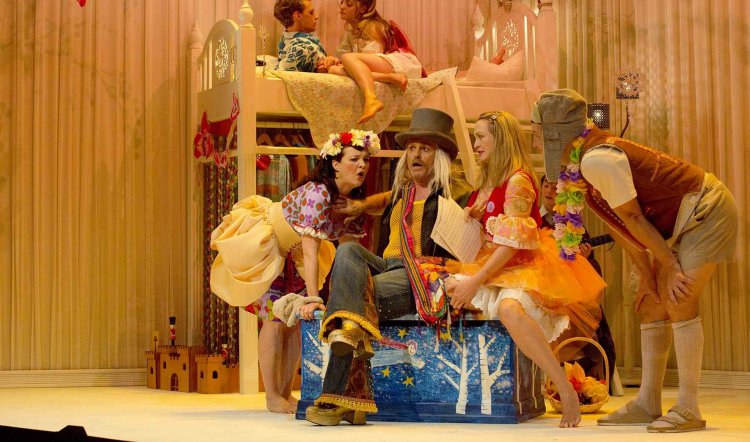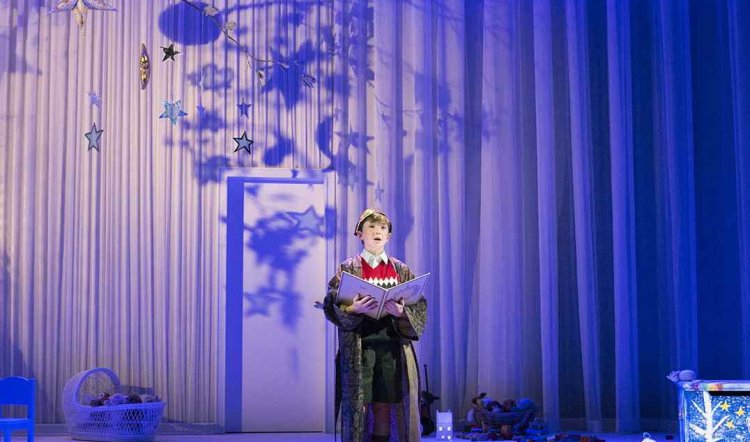
THE WINTER'S TALE
THE WINTER'S TALE, Bell Shakespeare Company at the Playhouse Theatre, Sydney Opera House, 1-29 March 2014. Photography by Michele Mossop: (above) Michelle Doake, Terry Serio, Helen Thomson and Justin Smith; right: Rory Potter.
There is something shiveringly exciting about the phrase "Once upon a time…" it promises so much and all of it mysterious and steeped in anticipation. This new production, directed by John Bell for Bell Shakespeare Company, achieves that shiver in the first instance with Stephen Curtis's fairytale setting of a child's bedroom.
The space is defined by diaphanous white sheers, a white floor, a white, fretwork-decorated kid's bunk bed reached via a ladder and hung beneath it, a wardrobe of multicoloured clothes that hide an entrance-exit. The mood and purpose change in an instant via washes of successive coloured lighting sets - cool-cruel blue, warm-happy pink, merry golden-orange. Above the bunk bed hangs an oversize mobile with stars and twinkly and twiggy bits whose shadows can be projected onto the drapes and become enchanting or menacing by turn in an imaginative lighting design by Matthew Marshall.
Before the play even gets underway therefore, there is a strong message that we are entering a place of make-believe, the realm of memory and imagining, dreams and nightmares. And it's very powerfully the domain of the young prince Mamillius (Rory Potter alternating with Otis Pavlovic). His presence throughout as spirit and magician signals the production's overarching intent: leave behind the everyday, the logical and the rational.
This is a Shakespearean fairy tale, however, so cuteness is notably absent. Mamillius is already dead of a broken heart having seen his father Leontes, king of Sicily (Myles Pollard) consumed by jealousy and obsessed that queen Hermione (Helen Thomson) is pregnant by his friend Polixenes, king of Bohemia (Dorian Nkono). Protestations of their innocence from courtiers and even the Delphic Oracle only deepen his conviction and Leontes orders the faithful Camillo (Philip Dodd) to kill Polixenes. Instead, Camillo and Polixenes make a run for it to Bohemia as Leontes sends Hermione to a dungeon. There she gives birth to a daughter - who is taken away and abandoned to die in the forest. Hermione also dies of a broken heart.
The Winter's Tale has for long been known as one of Shakespeare's "problem" plays. From this audient's point of view it's because it's one of those frustrating works where virtually everything interesting or exciting happens offstage and is merely described by someone onstage. It's the antithesis of drama 101 - "show, don't tell" - and seems wilfully obtuse on the part of the playwright. The director has partially overcome this absence of action by reversing Mamillius's fate as written (he dies offstage) and having him act as observer, interlocutor and catalyst in turn. And in this demanding role Rory Potter (already a Sydney Theatre Award winner) again shows that he is a genuine and developing talent.
Nevertheless, the first half is so light on drama and so heavy with exposition it fair makes your teeth ache. The only spark in the enveloping dreariness is the presence of Michelle Doake as Paulina, a not-to-be-trifled with lady of the court and wife of Antigonus (Terry Serio). Doake is a skilled and experienced Shakespearean actress and also a brilliant comedic performer - every time she appears the stage lights up and there is suddenly the possibility of laughter and interest in the air.

Doake's electrifying effect on the play is especially noticeable when, in the second half, she and Helen Thomson are united as a pair of daft rustics - Dorcas and Mopsa. Their interaction and, in particular, a dance sequence in which Justin Smith as the Young Shepherd also takes part, are the only too brief highlights of the piece. Thomson - released from the burden of what has gone before - is suddenly recognisable as her usual clever, hilarious and watchable self.
So, as Thomson and Doake excel, the problems of the production of the problem play become clear. The casting is so uneven it's like a return to the early days of Bell Shakespeare. Back then, some of the actors couldn't speak the lines even if their lives had depended on it, while others at least had learned the lines but had no idea what they meant, and a few actually knew what they were doing - and did it beautifully.
If Myles Pollard knows who Leontes is and what he feels and why he feels it, he's keeping it to himself and instead, delivers his lines as if he's wandered in off the set of McLeod's Daughters and been told to emote and make like King O'Malley. Fatally for this production, there is a sinkhole where a charismatic, dangerous but finally pitiful man should be and almost everything in its near vicinity is sucked in, never to be seen again.
In the second half Terry Serio returns as the charming wandering minstrel-pickpocket Autolycus and has tongue-in-cheek fun with Alan John's songs, but again, authenticity and meaning are leached away by others who just can't cut it at this level, yet or ever (hard to say which). It's a disappointment that feels worse because of its early promise and because in the rough, old-fashioned stuff are some glittering gems, namely Michelle Doake and Michelle Doake.



